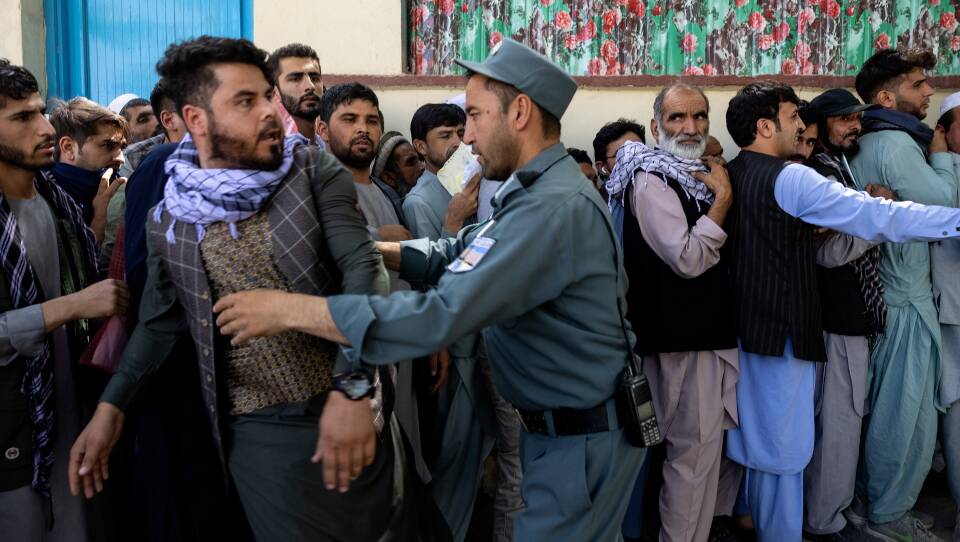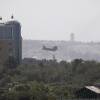Yesterday, Afghanistan’s government fell and the Taliban once again took control of a country that the United States had been fighting to prop up for two decades. For many watching from the United States, a single — and urgent — priority emerged: Evacuating Afghan translators and others who had allied with U.S. forces, as quickly as possible.
John Velis, a Bronze star Army veteran who served two tours in Afghanistan who is now a state senator in Massachusetts, said Monday that he had received a call from an Afghan translator he’d worked with. The translator is still in Afghanistan.
“[He] said that the Taliban were going door to door in his neighborhood,” Velis said. “And he said, 'I've been left behind.' And I don't, I don't have a response for that right now, and that really pains me.”
U.S. Rep Seth Moulton has been vocal about the need to get translators to safety as U.S. troops rapidly withdrew. He spoke with GBH News in late June about his concerns, saying that, between the translators and their families, there were an estimated 70,000 people for the United States to protect.
More International News
“These Afghan interpreters and drivers and advisors, they're not just Afghan heroes, they're American heroes because they've risked their lives, not just for Afghanistan, but for America, for our troops,” Moulton said. “And they were willing to risk their lives because we told them ‘we have your back.’ And because we said that they now have a target on their backs, so we got to get them out.”
The Special Immigrant Visa (SIV) program grants visas to Afghan allies — namely, translators and others such as drivers — who helped U.S. troops on the ground in Afghanistan. But its slow-moving bureaucracy and limited resources have been known roadblocks for years.
President Joe Biden spoke about the program in his address Monday, saying that 2,000 SIV-eligible Afghans have been moved to the United States since July under Operation Allies Refuge.
“In the coming days, the U.S. military will provide assistance to move more SIV-eligible Afghans and their families out of Afghanistan,” Biden said. “We're also expanding refugee access to cover other vulnerable Afghans who worked for our embassy, U.S. non-government agencies or the U.S. non-governmental organizations and Afghans who otherwise are at great risk.”
Rahmatulla Aka came to the United States in 2015 from Afghanistan through the SIV program. Now, he works at the International Institute of New England in Boston.
“Those people that worked alongside the U.S. mission, they are all scared,” he said. “That's why they are rushing to the airport, they're rushing to find a way to move out because they know that they [the Taliban] will come up to their homes and they will be targeted and they will be taken away.”
The United States could use another program to help ordinary Afghan citizens: It could designate Afghanistan for Temporary Protected Status (TPS), says Daniel Pereira with the Massachusetts Immigrant and Refugee Advocacy Coalition. That would make a set number of Afghan people eligible to come to the United States for a prolonged period of time to escape conflict, where they would be able to work and not be removed or detained based on their immigration status.
“What we want to see going forward is a strong commitment to helping everyone, to helping every person in Afghanistan who is seeking asylum, who is seeking refuge as a result of this ongoing political and military crisis,” Pereira told GBH News.
Waheed Zarif came to the United States for the first time in 2005 to go to high school and went on to study at Dartmouth College. He applied for asylum in the U.S. after his father was killed.
Although he's safely in America, he still has family he's trying to get out of Afghanistan.
“The border crossings are closed. What I'm trying to do is hopefully get them a visa to one of the neighboring countries," Zarif said. "Just remain there for a few months, maybe a year to see if the situation improves."
The rapid evacuation from Kabul, as well as the chaotic scenes at the city’s airport, drew comparisons to the American exit from Saigon at the end of the Vietnam War in 1975. Anh Vu Sawyer was a college student who left Saigon that day — she boarded an American helicopter and came to the United States, where she is now the executive director of the Southeast Asian Coalition of Central Massachusetts in Worcester.
Vietnamese refugees and immigrants, Sawyer said Monday, have “contributed to this country, not because we have to give back, but we want to give back and we want to have a part in the thriving, in the vibrancy, of this country. And we take great pride of being Americans.
“I would like very much for Americans, people everywhere in this country, to be prepared to support Afghanistan's refugees the same way they did for Vietnamese,” she continued. “After all, the U.S. presence in the Middle East had been there for a long time, the same in Vietnam, and mistakes were made. ... But they also have a very important role to evacuate, and to bring the people who worked with them during this war, to give the protection — to give them and their family protection. And this is what America is about.”
Thomas Barfield, a professor at Boston University, leads the American Institute of Afghanistan Studies. He said that he’s been trying to get those at the institute in Kabul out of the country for the last two weeks.
Barfield said nobody knows whether the Taliban reign this time will be more moderate than their hard-line rule two decades ago. “And that's one of the reasons the Afghans right now are so upset. Because literally in two weeks their world is turned upside down.”
Esteban Bustillos, Aaron Schachter and Judie Yuill contributed to this report.









